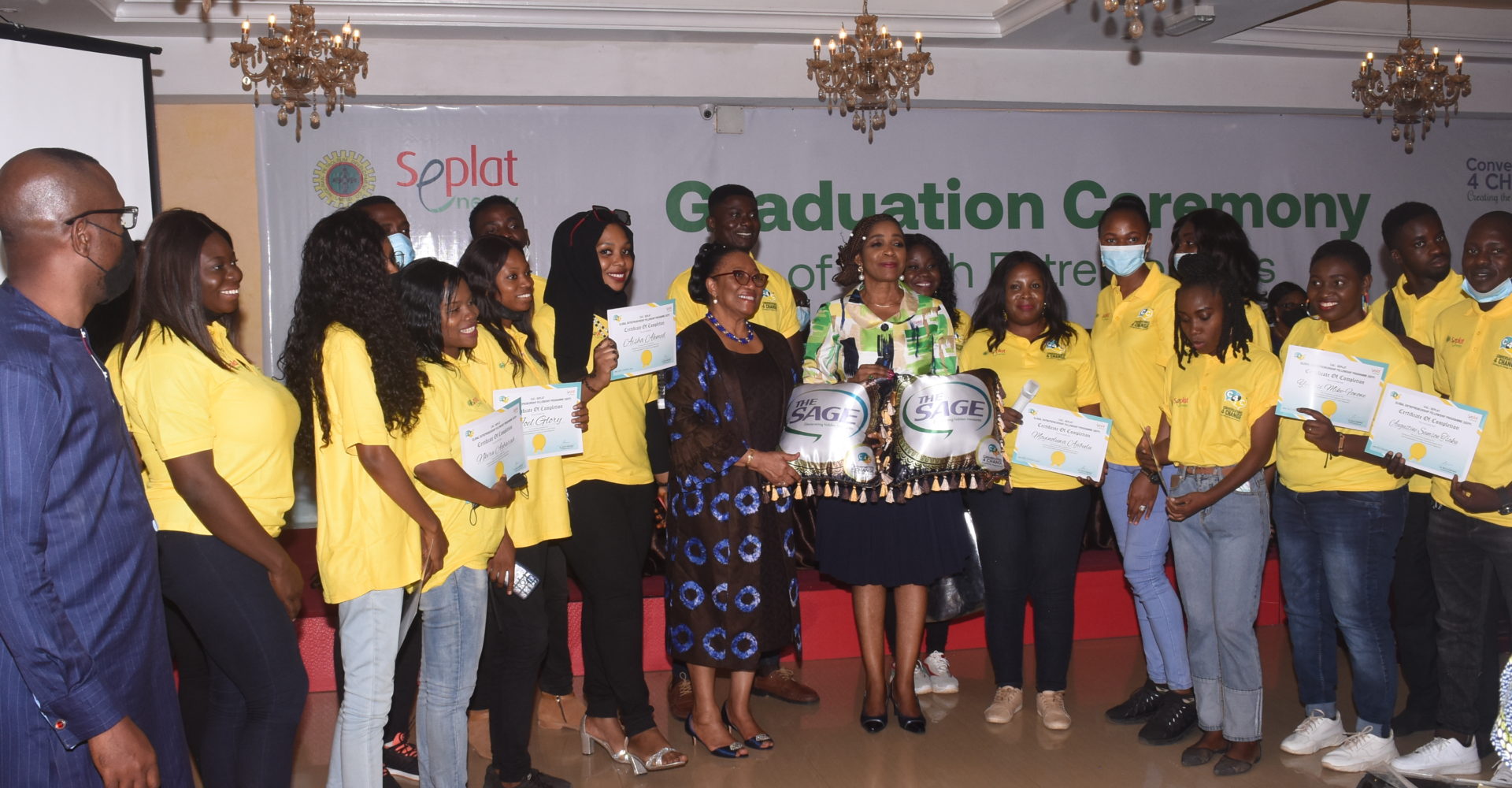Fellows from the Seplat Energy, C4C Entrepreneurship/ Skills Acquisition Programme at the graduation ceremony held in Abuja.
Seplat Energy Plc, a leading Nigerian energy company listed on the Nigerian Exchange and the London Stock Exchange, in partnership with Conversations for Change (C4C) has announced the graduation of 15 Fellows from the duo’s entrepreneurship programme.
The 2021 batch of Fellows have been equipped to begin their business empires, which are expected to grow and flourish as well as provide support to not just them and their families, but also for communities, countries and indeed the world.
C4C is a non-profit organisation with a major objective of empowering young people to participate more effectively in all relevant areas of development.
Efforts are focused on young people aged 18-40, in the belief that they are ready to embark on being valuable and creative members of their society and therefore are most in need of the inspiration, empowerment, guidance and support to do so.
Speaking at the ceremony held in Abuja on Friday, the Director, External Affairs and Sustainability, Seplat Energy, Dr. Chioma Nwachuku, said Seplat Energy’s partnership with C4C in this regard is a bold step taken to realising the United Nations’ Sustainable Development Goal 1, which is the poverty eradication; in addition to the SDG 2 (Zero Hunger), SDG 3 (Good Health and Well Being), SDG 4 (Quality Education), and SDG 8 (Decent work and Economic Growth), as driven by the company’s CSR initiatives.
Dr. Nwachuku added: “The vision of this initiative is to create a world where young people/minds are inspired, motivated and empowered to find their niche in society and use their skills and talents in improving their societies/countries and indeed their world. In doing this, day-to-day items and wastes are converted to wealth, thus promoting a sustainable world.”
The CEO Seplat Energy Plc, Mr. Roger Brown, in his message, described the Conversations for Change as a long-term effort to invest in the next generation of leaders, through creating a vibrant platform for continuing information provision, dialogue, and discussions. He added that through these and other strategies, the initiative would inspire, encourage and support young people to become active partners in the development and leadership of their communities, societies, nations and indeed the world.”
Brown stated: “Seplat Energy aspires to be a good corporate citizen, committed to driving positive socio-economic benefits for our country and our other stakeholders, and recognising that we must continuously earn our social licence to operate. Indeed,
we embed this commitment in one of the five strategic pillars that guide our approach to business: Behave responsibly and share our success.”
The beneficiaries for the 2021 session are: Moyinoluwa Ajibulu (Kogi); Ruke Ejegreh (Delta); Yemisi Olarewaju (Osun); Aisha Ahmed (Edo); Indira Orbih (Anambra); Ruth Ede (Imo); John Tokula (Kogi); Rachael Bob (Rivers); Elizabeth Nyong (Cross River); Augustine Samson Tsaku (Nasarawa); Joel Glory (Kogi); Nkiru Agbarah (Abia); Anefu Lilian (Benue); Jude Elayo (Nasarawa); and Ene Adah (Benue).
Responding, the President/Founder, C4C, Dr. Kechi F. Ogbuagu, said: “Our dream as Conversations for Change is to see every young person in Nigeria, in Sub-Saharan Africa, and the world at large, living his or her best life – with a sustainable means of livelihood and financially empowered. They will thus contribute to the economy and become relevant and influential members of the society and become key players in the areas of entrepreneurship, leadership and governance.
“The role the entrepreneurs play in economic development cannot be over-emphasised, neither can the importance of social entrepreneurship be overstated. While entrepreneurship may create a source of livelihood for a creative entrepreneur, social entrepreneurship has the power to change the life of not just one creative entrepreneur, but the lives and living conditions of an entire community.
“Our aim, therefore, is to inspire and provide as many young people as possible with the skills required for becoming successful social entrepreneurs.”


Comment here